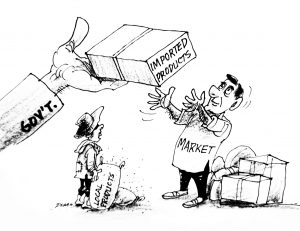Our country is known for its diverse agricultural sector. Despite the country’s potential for agricultural productivity, it still heavily relies on importation of agricultural products to meet its domestic demand. Why does the government resort to the importation of agricultural products? What are its implications for the country’s economy and food security? And what potential strategies can reduce this dependency?
Several factors contribute to the Philippines’ importation of agricultural products. Firstly, the country faces challenges in terms of land scarcity and limited arable land, resulting in inadequate domestic production capacity. Additionally, natural disasters such as typhoons and droughts often lead to decreased agricultural output and further necessitate imports. Moreover, the lack of advanced farming techniques and infrastructure hinders productivity and the ability to meet domestic demand independently. Lastly, the preference for cash crops, such as tobacco and sugarcane, instead of staple crops, contributes to the need for imports.
The importation of agricultural products has significant implications for the Philippine economy and food security. On the one hand, it provides an opportunity for economic growth and stability through revenue generation, employment, and increased trade. However, heavy dependency on imports poses risks to the country’s food security and self-sufficiency. Relying on other countries to meet domestic demand puts the Philippines at the mercy of global market fluctuations, impacting food accessibility and affordability for its population. Furthermore, it weakens the agricultural sector’s competitiveness and stifles local farmers’ growth potential.
To reduce the importation of agricultural products, various strategies can be implemented. There is a need for investments in research and development to enhance farming methods, increase productivity, and improve the quality of local crops. This could be achieved through partnerships between the government, academic institutions, and private companies to ensure the transfer and adoption of advanced agricultural technologies.
Promoting diversification of crops by incentivizing farmers to focus on staple food production can contribute to reducing import dependence. The government should then prioritize policies that support domestic farmers, such as providing access to credit, improving irrigation systems, and investing in rural infrastructure.




